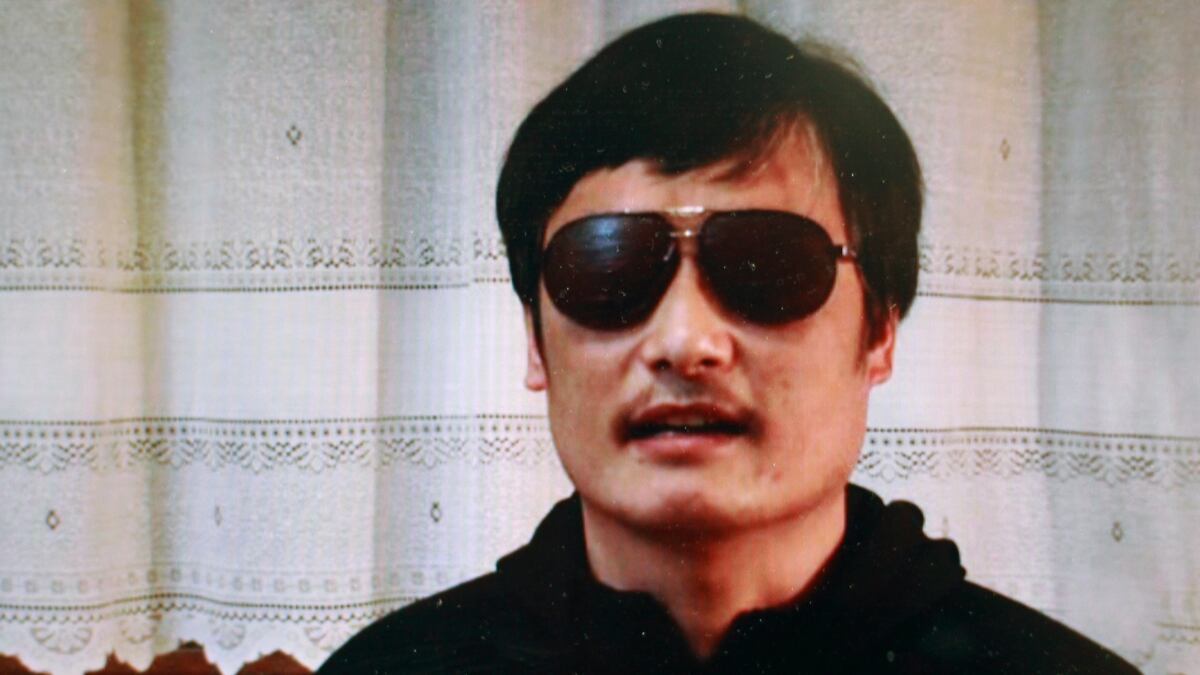The daring escape from house arrest by blind Chinese rights lawyer Chen Guangcheng, who is believed to have found refuge in the United States embassy, has sparked a major diplomatic crisis between the two governments as they prepare to meet for a series of top-level negotiations here next week.
After 19 months under round-the-clock surveillance by security agents in his village in China’s northeast Shandong province, Chen clambered over a wall last Sunday night and into the hands of supporters who trundled him to safety. They then delivered him to the embassy last week, according to the Texas-based human-rights group ChinaAid.
U.S. officials have refused to comment on whether Chen is under their protection, a telling sign of how extremely delicate the situation is just days before Secretary of State Hillary Clinton and other members of the Obama administration arrive in Beijing for the U.S.-China Strategic and Economic Dialogue. The U.S. had been hoping to win Chinese support for a series of initiatives ranging from Iran to trade, but the standoff over Chen is likely to severely complicate those talks.
Chen, 40, became an enemy of the state after he infuriated local officials by defending thousands of women who had been subjected to forced abortions and sterilizations in his home province. Following a lengthy prison sentence on what supporters say were trumped-up charges, he was released in 2010 and then confined to extra-legal detention in his stone farmhouse along with his mother, wife, and 6-year-old daughter. While he was under house arrest, the Chinese government dismissed international criticism of Chen’s plight and violently prevented supporters, including the actor Christian Bale, from entering his village.

That a blind man could escape numerous rings of cameras, floodlights, and guards and reach U.S. protection is an unprecedented loss of face for the Chinese government, which has yet to comment on the matter. China’s Vice Foreign Minister Cui Tiankai refused to answer questions about Chen during a Saturday briefing on the upcoming dialogue. This is the second time in three months that a Chinese citizen has sought American protection in China. In February, Wang Lijun, the former police chief of Chongqing fled to a U.S. Consulate with evidence of a murder plot of a British businessman. He spent several hours in the consulate before he was turned over to Chinese police. That episode triggered a scandal that led to the purge of the Chongqing party secretary Bo Xilai.
Today, the two governments are reportedly in tense discussions over how to resolve this latest diplomatic crisis. "Chen is under U.S. protection and high-level talks are currently underway between U.S. and Chinese officials regarding Chen's status,” said a statement by ChinaAid, citing close sources with knowledge of the diplomatic communications.
Since foreign media began reporting on Chen’s escape and possible U.S. protection on Friday, Chinese authorities have sought to keep it hidden from the public. There has been no coverage of it in the traditional media, and all references to Chen were blocked from social media, including the search terms “Guangcheng,” “CGC,” and “blind man.”
The Chinese government is also secretly going after those who were involved in aiding Chen’s flight. On Friday, public-security agents detained He Peirong, an activist who drove him from his village to a safe house. Before she was taken away by police, she told CNN that Chen has been planning his escape for months. To prepare, she said, he would lie in bed for hours so that the guards wouldn’t become suspicious if they saw no movement for a long period of time. Once he climbed over the wall, Chen alerted the activists. "We learned that he had escaped and needed our help," she said.
While in hiding, Chen recorded a video subsequently posted online in which he demanded Premier Wen Jiabao protect his family, investigate those who beat them, and fight corruption, while recounting the cruel treatment they endured under house arrest.
Wearing a pair of dark sunglasses, Chen faced the camera and told of how police officers repeatedly entered their home and attacked them. On one occasion, "over a dozen men broke into our house and violently beat up my wife. They pushed her to the ground, covered her in a duvet and beat her up for hours.” He then described how 10 men pinned him to the ground and gave him a beating.
Chen went into grave detail about the abuse of his family, stating that the men broke his wife’s eye socket and prevented her from seeking medical attention, and that his elderly mother was attacked on her birthday. Even his 6-year-old daughter was a target of intimidation, first being forbidden to attend school and then followed every day by three officers. “She is searched every day,” Chen said. “Everything from her school bag is taken out. Her books are flipped through. She is watched at school and not allowed to go out.”
Chen also recounted that a senior Communist Party official “announced several times that 'We simply don't need to care about the law; we don't need to care about what's written in the law; we don't need any legal process. What can you do?’... I asked them who they are, if not the police. They said: 'We are sent by the party to do things for the party.'"
At one point in the video, Chen said he fears “insane retribution” against his family. "Although I'm free, my worries are only deepening," he said. "My wife, mother, and children are still in their evil hands. They have been persecuting my family for a long time, and my escape would only prompt them into a mode of revenge." The whereabouts of Chen’s wife, daughter, and mother are unknown.
Since his escape, authorities have detained at least four of his relatives, according to the organization China Human Rights Defenders. Guards broke into the home of his brother and nephew, and took them into custody. His brother was said to have grabbed kitchen knives to defend himself.
“We’re very concerned that authorities appear to have launched a round of retaliation against Chen’s family, relatives, and activists who assisted Chen Guangcheng’s flight for freedom,” said CHRD’s international director, Renee Xia, in a statement.
Bob Fu, the president of ChinaAid, which has long lobbied for justice in this case, said that Chen hopes to live freely in his homeland rather than go into exile abroad. “He wants to stay in China and keep fighting to the end,” he said.
The case has thrust President Obama into a perfect political storm of global magnitude at a time when the U.S. needs China on its side. While Secretary Clinton has in the past demanded Chen’s freedom, American officials know that making public pronouncements now about human rights can only backfire. Instead, their silence implied that they are using quieter tactics in order to provide China enough diplomatic cover to set Chen free. “It’s a time for subtle, low-key diplomacy,” said Susan L. Shirk, a former State Department official who is now a professor at the University of California, San Diego. “The U.S. is trying not to get in the middle of this in a way that will provide China with the excuse to blame ‘hostile foreign forces.’”
Still, she said, behind closed doors U.S. diplomats are playing hardball to ensure that China doesn’t renege on the deal once Chen leaves the embassy. “They're not going to just release him with a handshake,” she said.





